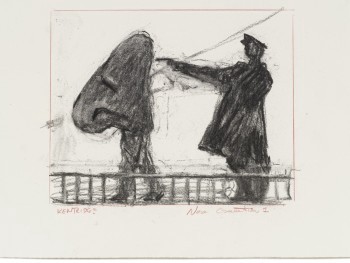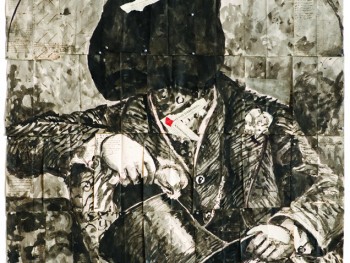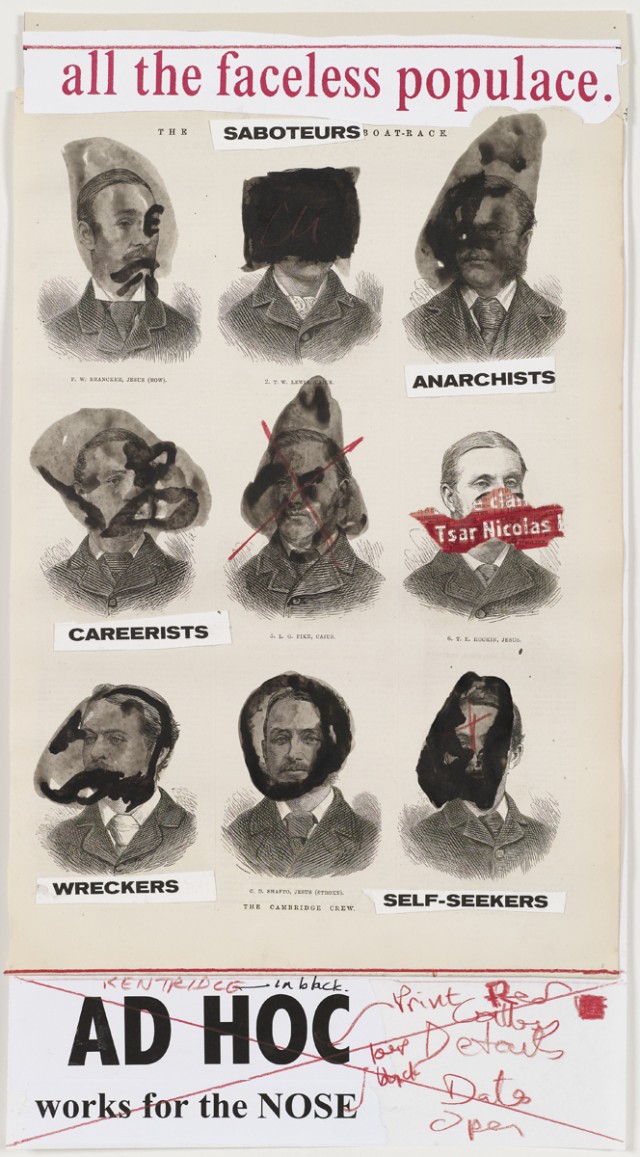Difficult Listening Hour: William Kentridge To Direct Shostakovich, Redeem Winter in NYC
by Seth Colter Walls

Sweet fuck, am I ever tired of this wind and snow and cold and sniffling. I’ve been eating over half my meals at the diner that’s 20 steps away from my front door, because walking anywhere-save for the subway line that takes me to work-has become untenable. The gym? The one that’s two blocks away? Haven’t seen it since January. And yet, this week, I plan to leave my apartment, post-sundown, for a non-work related engagement. It better be worth it. My whole reason for persisting through that entire awful month of February is riding on it. I suspect we’re talking about the kind of awesome that makes a city with as many petty annoyances as this one actually worth the navigating. Talking Boredoms-with-77-drummers amazing, here. Serious.
And here’s why: South African visual artist William Kentridge is making his directorial debut at the Metropolitan Opera. Originally, when the people there approached him to direct, they said: “How about you stage some random Verdi piece no one ever does? Opera-goers can’t get enough Verdi.” But, according to the New Yorker, William Kentridge would not have this. He said-and I’m forced to speculate here, since Team Remnick didn’t give us exact quotes in their report-”I’m gonna do some wild-ass, Stalin-upsetting Dmitri Shostakovich or nothing at all. And we’re gonna have awesome film projection and animation stuff in the stage designs, or else.” And so here we are: graced by an all-too-rare staging of Shostakovich’s The Nose-based on the Nikolai Gogol short story of the same name-in which a St. Petersburg official wakes up one morning to find that his nose has left his face and is running about town, acquiring a higher bureaucratic rank than the man himself in the process. (!!!, right?)

“Oooh, the opera,” you’re maybe saying, while extending your pinkie-finger and pretending to sip from an extraordinarily delicate glass of champagne. (Good one.) But this work in particular is balls-out radical, and standing room tickets won’t even be as expensive as Bowery Ballroom passes for an uncomfortably-packed Animal Collective concert. I could tell you more about this brand spankin’ new production, but why not just watch the video below? It has pretty pictures and insightful commentary, both courtesy of Kentridge:
Keep in mind that the animations and stage projection you see in that preview are just the backdrop for the performance. They’re still working out all the blocking for the singers right now, during rehearsal-about which, the Times published some amusing behind-the-scenes reportage over the weekend:
“Be like inflatable objects,” Mr. Kentridge told his loose cluster of lawmen, expanding in three dimensions as his lungs filled with air, shrinking again as he let the air go. “Sing from the deflated position. And crush your bodies together. This is a contact sport.” Things began to look more promising.
“It will be great if we can get everyone to do it,” Mr. Kentridge said when the company was released for lunch. “It takes an hour to rehearse what? One minute?”
Now, I was going to wait until I saw the premiere to tell everyone to go. (Critical integrity and all that.) But because Kentridge is “hot” right now with his new show at MoMA, it turns out this six-engagement jam is almost entirely sold out. So if you want to go, you’ll need to plan ahead. The cheap seats at the very back of the house? Gone. Pretty much all that’s left, seat-wise, are some stray spots in Balcony, Dress Circle, and Orchestra in the $60-$100 range. But if you want to limit your spending to $20 or so, you can still go “Standing Room” at the orchestra level, or, if that sells out, standing room at the very back of the house. (Standing room, you say? Don’t worry, standers get to lean on a post in front of them that also runs the English subtitles throughout. Ever walked around a museum for 2 hours? You’ll be fine. Also, you can sit in some fancy person’s seat during the intermission, when everyone is out in the lobby lapping up watery coffee and champagne.) Standing room positions go on sale the same day of each performance. You gotta call the Met’s box office or go online between 10am and noon, though, because they get snapped up pretty quick during sold-out runs.

[The composer, as sketched by Kentridge. Courtesy-as with other images-of the artist and Marian Goodman Gallery, New York. Currently on display at Gallery Met in the south lobby of the opera house.]
As for Shostakovich, The Nose was his first opera-and it bears all the hallmarks of an ambitious talent’s debut stage piece. Like plenty of subversive works, it contains a mashup of styles: references to folk form, high-modern dissonance, some old-school Romantic flavor. It goes high, and it goes low-but mostly, it goes hard. After its first run of performances in 1930, it was banned as “formalist” (i.e., too Western): just the first time Stalin would toy with the nervous Shostakovich. (You’d be nervous, too, working under that watchful eye.) Still: the opera survives, and it’s a corker-popping out of the orchestra pit with galloping percussion, and sardonic, piercing brass, etc.
Some of the opera’s most subtle music, however, takes place in Act I, when Kovalev locates his errant Nose at a cathedral. The dialogue between the two is interrupted (or supported) at various intervals by a pious chorus of worshipers, who also introduce the scene. There’s a compelling, see-saw quality to the score as it moves back and forth between Kovalev’s despondent pleading, The Nose’s high-minded dismissal, and the suggestion of (unattainable) peace offered by the churchgoers. I pretty much can’t wait to see how it works with a proper staging. Here’s the clip from the best audio recording currently on the market:
As a further pot-sweetener, this run will be conducted by Valery Gergiev, who also conducted the performance in the YouTube clip up above. He’s today’s definitive baton-swinger when it comes to the core Russian rep, and he’ll be doing his sweaty, unshaven, mercurial thang in the pit-muttering under his breath and such. (Trust: I talked my way into a Row B orchestra seat when he did Prokofiev’s The Gambler and saw/heard first-hand.)
Bottom line: You think the bastards got you down? So much so that it’s tough to crack a smile? Gogol knew from comedy, and Shostakovich knew from bastards. They made this thing for you. (Though, of course, it’s not as though Gogol got to sign off on the operatic adaptation.) Eight decades after Stalin stepped on it, the Metropolitan Opera is interrupting its regularly scheduled parade of mostly-mainstream fare in order to bring it to you. PBS won’t be broadcasting it (don’t get me started), nor will this production be coming to DVD, so you gotta go to the house to see it. But, you know, the house is a very nice place to spend a couple hours. In a town that is often a mess, graced by weather which is frequently terrible and people who are usually disappointing, it’s important to go get some of the unique greatness it can offer.
I’ll probably go a couple times. I planned ahead and got tickets for the premiere, but after that, you can catch me in standing room. With the likes of these guys, maybe:

Seth Colter Walls can get enough Verdi, in case anyone running an opera company was wondering.
Life And Death And Death After Life
“When Gupta was asked how a physician deals with such apparent medical miracles, he fell into the fallacy of the argument from ignorance: ‘When I was researching this for a long time, I thought I was going to explain it all away physiologically. But things that I heard and validated and subsequently believed convinced me that there were things that I could not explain. There were things that were happening at that moment, that near-death experience moment, that simply could not be explained with existing scientific knowledge.’ So what? The fact that we cannot fully explain a mystery with natural means does not mean it requires a supernatural explanation. It just means that we don’t know everything. Such uncertainty is at the very heart of science and is what makes it such a challenging enterprise.”
–Michael Shermer writes an entertaining and important piece in Scientific American
about his experience of going on “Larry King Live” in December to discuss near-death experiences-or, as some of his less-convincing fellow guests from that night might put it, “life after death.” (Deepak Chopra goes off!) Also: it’s March, so, Biggie!
The Sandpit
File under: things that are WAY TOO COOL to worry about whether or not they’re “Internet old.” If you haven’t seen this, watch it. If you have, watch it again. [Via]
Smug Vegan Jonathan Safran Foer Has Lunch
Financial Times writer Emily Stokes recently had lunch with Jonathan Safran Foer at Gobo, a vegan restaurant on Sixth Ave. She seemed to find his personality as distasteful as their meal. His “Rejuvenate” juice, she writes, was “the color of manure.” [FT]
The Very Hungry Panda Bear
We will forgo the usual discussion as to whether pandas are actually bears-they are not-to note that, whatever side of the debate you come down on, you’ve got to admit they do home invasions much more adorably than their ursine counterparts.
The 22 Greatest Songs Written For Commercials

22. Cherry Chocolate Dr. Pepper (Tay Zonday)
21. My Buddy/Kid Sister
20. Mr. Spriggs BBQ
19. Doublemint Gum (Chris Brown)
18. Bagel Bites
17. Betty Crocker (“You Sweet Talker,” 1985)
16. McDonald’s McNugget Love
15. The Gap (“Talk To The Moose”)
14. Big Red
13. Flea Market Montgomery (Sammy Stephens)
12. Chili’s (Baby Back Ribs, *NSYNC)
11. Doublemint Gum (“Twins”)
10. Baskin-Robbins (“Ice Cream and Cake”-Full song here)
9. Almond Joy/Mounds (“Sometimes You Feel Like A Nut”)
8. McDonald’s (“Give Me Back That Filet-O-Fish”)
7. Pepsi (Britney Spears)
6. IO Cablevision (“Reggaeton Beach”)
5. Mentos
4. Subway (“5 Dollar Footlong”)
3. Subway (“Cinco Dolares Por Un Sub De Un Pie De Largo”)
2. Kit Kat
1. Oscar Mayer
David Cho is the publisher of The Awl. He eats a lot of fast food, usually in front of the television.
"Just write, get better, keep writing, keep getting better. It's the only thing you can control."
People will tell you to read Will Leitch’s story about Roger Ebert, and they will be correct to do so. Even if you think that after the Esquire profile and Ebert’s response you are all Eberted out, you should still give this a shot.
Pavement Reunion Setlist
It’s the setlist for the first show of the Pavement reunion! This will be very meaningful to some of you.
British Politician's Ass Remains Firmly Planted In Its Seat

Oh, Knifecrime Island, how I do love your turns of phrase: “David Cameron denied it was ‘squeaky bum time’ for his party today after a shock poll showed Labour could still be in office after the election. The Tory leader admitted it would be a ‘tight contest’ but said a close race was good because it would focus people’s minds on how they should vote…. Asked during an interview on Heart FM this morning if it was ‘squeaky bum time’ for the party, he laughed and replied: ‘There’s certainly nothing squeaking over here.’”
Right-wing Dictators Are Good For Earthquake Safety

Why was the damage from this weekend’s earthquake in Chile so much less destructive than the recent tragedy in Haiti? The Wall Street Journal editorial page has a theory!
One reason is luck, as the quake hit offshore and away from populated areas, save for the city of Concepcion. But even in that city of one million, the death toll might have been worse. That it wasn’t is due in part to Chile’s stricter building codes, which have been developed over long experience with quakes along the Eastern Pacific fault line. Chileans have prepared well for the big one.
But such preparation is also the luxury of a prosperous country, in contrast to destitute and ill-governed Haiti. Chile has benefited enormously in recent decades from the free-market reforms it passed in the 1970s under dictator Augusto Pinochet. While Chileans still disagree about Pinochet’s political actions, they have not repealed most of that era’s economic opening to the world.
Yes! Thank you, Augusto Pinochet. I’m sure that the 200,000 people estimated to have been traumatized during your coup and subsequent reign of terror are deeply appreciative of the way your economic policies helped prevent a bigger tragedy. I mean, at least the ones who weren’t killed back then.
